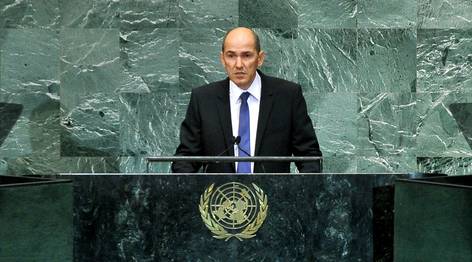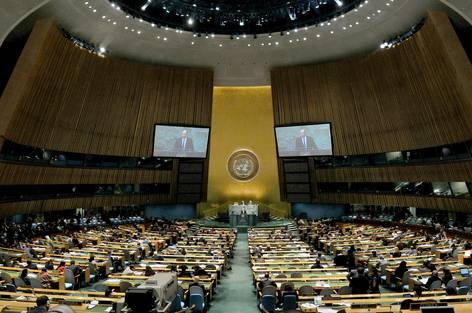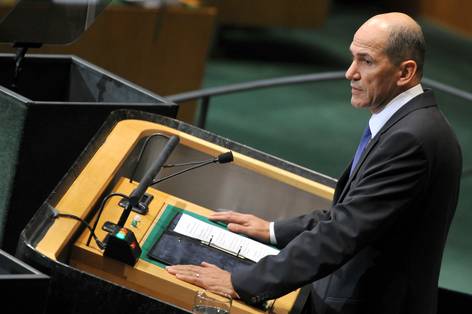NEWS
Prime Minister of the Republic of Slovenia, Janez Janša, urges to join efforts for a world free of genocide
Prime Minister of the Republic of Slovenia, Janez Janša, today addressed the 67th General Assembly of the United Nations, calling all Member States to support the initiative to strengthen the mechanisms of the Convention on the Prevention and Punishment of the Crime of Genocide. In his address, the Prime Minister reiterated the necessity for enhancing legal mechanisms for early action in preventing genocide and mass atrocities and stressed that 60 years after its adoption, the Convention needed to widen its scope and enhance its efficiency.
Prime Minister Janez Janša opened his address by recalling the main topic of this year's session, that is, peaceful resolution of conflict, and the fact that all Heads of State in their addresses underlined the necessity for increased awareness and effective prevention of atrocities that we are, unfortunately, still witnessing. Prime Minister Janša mentioned the case of Syria, where mediation activities failed and stressed the need to consider strengthening preventive capacities of the UN, its Member States and international organisations.
Speaking to the delegates on the issue of genocide, Prime Minister Janez Janša recalled that last year we celebrated 60 years since, after years of tireless efforts by Mr Raphael Lemkin, the Convention on the Prevention and Punishment of the Crime of Genocide was adopted. He added: "We waited for more than half a century to see the first conviction of an individual for the crime of genocide", stressing that the establishment of international criminal tribunals was a milestone in the development of international relations.
The Prime Minister Janša quoted in his speech the US President Barack Obama’s speech at the US Holocaust Memorial Museum last April where he made the point that "national sovereignty never is a license to slaughter your people". Mr Janša also mentioned that the UN Secretary-General, Mr. Ban Ki-moon, urged at the opening of this session that we should give the concept of the “responsibility to protect” a tangible meaning.
"Since the end of World War 2 more than 80 countries have witnessed mass atrocities. At least 53 million innocent lives have been lost. Behind these numbers there were actual men and women, and also children. They had future but were not allowed to live," said the Prime Minister and called for development of a viable strategy to prevent genocide and other mass atrocities, and added that "a mechanism is needed to enable a more rapid and effective response to acts of genocide and other mass atrocities".
Prime Minister Janez Janša declared that Slovenia is ready to play an active role in further development of this initiative, and pointed out that the initiative originates from international non-government organisations and civil society individuals and is gaining in support. He continued by saying that collaboration concerning the prosecution of alleged perpetrators of such crimes should be enhanced, and that a genuine culture of prevention should be developed globally. In this context he strongly condemned acts of violence against diplomatic and consular missions in the Arab world and stressed that freedom of speech is fundamental in democracy, and violent response has never set limits on that freedom.
Prime Minister Janez Janša ended his intervention at this year's session of the General Assembly of the United Nations by the following words: "We assumed responsibility for the world from our fathers and have the enormous responsibility of making it a better place for our children. I therefore invite you to do so by joining our efforts for a world free from genocide."
At the margin of the session Prime Minister Janez Janša gave a number of interviews to foreign media. In his interviews for the Wall Street Journal and the Associated Press, he primarily spoke about the current financial situation in Slovenia and the legislation being adopted for its stabilisation. The Prime Minister assured that Slovenia is able to solve present difficulties on its own. He added that the Slovenian Government, through the proposed amendments to the labour, pension, bank and business legislation and by adopting other important measures, is sending a signal to international markets that Slovenia is a reliable and potential business partner. The Prime Minister also presented in detail Slovenia’s initiative, presented at the General Assembly of the United Nations, for strengthening the mechanisms for effective prevention of genocide and mass atrocities.










